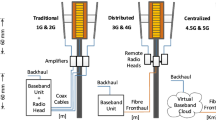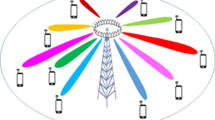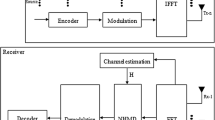Abstract
In this paper, a MIMO system with finite-bit feedback based on fixed constellations is considered. Based on performance analysis of the system, an optimal operating system with maximum-likelihood decoding is demonstrated. Surprisingly, this operation reveals that the optimal way for the system to transmit signals needs to invoke the multimode scheme. We propose designing criteria for this scheme and methods for pre-codebooks, and a method to determine the number of modes for any specific channel. Furthermore, to reduce encoding complexity at the receiver side, we also develop a fast encoding algorithm. Theoretical analysis and simulations show that the proposed systems offer considerable gain over existing systems. Moreover, these systems also have much lower encoding complexity. Indeed, for the case of a MIMO system with two pairs of transmitting and receiving antennas, a properly designed system with a transmission rate of 8 bits per channel use and with 6-bit feedback can provide about a 1.5 dB performance gain over a beamforming system.
Similar content being viewed by others
References
Goldsmith A, Jafar S A, Jindal N, et al. Capacity limits of MIMO channels. IEEE J Sel Area Comm, 2003, 21: 684–702
Visotsky E, Madhow U. Space-time transmit precoding with imperfect feedback. IEEE Trans Inform Theory, 2003, 47: 2632–2639
Blum R S. MIMO with limited feedback of channel state information. In: Proceedings of IEEE International Conference on Acoustics, Speech, and Signal Processing. Hong Kong: IEEE, 2003. 89–92
Zhou S, Giannakis G B. Adaptive modulation for multiantenna transmissions with channel mean feedback. IEEE Trans Wirel Commun, 2004, 3: 1626–1636
Zhang L, Wu G, Li S Q. Capacity bounds of transmit beamforming over MISO time-varying channels with imperfect feedback. Sci China Inf Sci, 2010, 53: 1417–1430
Love D J, Heath R W, Lau V K N, et al. An overview of limited feedback in wireless communication systems. IEEE J Sel Area Comm, 2008, 26: 1341–1365
Lau K N, Liu Y, Chen T A. On the design of MIMO blockfading channels with feedback-link capacity constraint. IEEE Trans Commun, 2004, 52: 62–70
Roh J C, Rao B D. Multiple antenna channels with partial channel state information at the transmitter. IEEE Trans Wirel Commun, 2004, 3: 677–688
Roh J C, Rao B D. Transmit beamforming in multiple-antenna systems with finite rate feedback: a VQ-based approach. IEEE Trans Inform Theory, 2006, 52: 1101–1112
Roh J C, Rao B D. Design and analysis of MIMO spatial multiplexing systems with quantized feedback. IEEE Trans Signal Proces, 2006, 54: 2874–2886
Zheng J, Duni E R, Rao B D. Analysis of multiple-antenna systems with finite-rate feedback using high-resolution quantization theory. IEEE Trans Signal Proces, 2007, 55: 1462–1476
Xia P, Giannakis G B. Design and analysis of transmit-beamforming based on limited-rate feedback. IEEE Trans Signal Proces, 2006, 54: 1853–1863
Jafar S A, Srinivasa S. On the optimality of beamforming with quantized feedback. IEEE Trans Commun, 2007, 55: 2288–2302
Mukkavilli K K, Sabharwal A, Erkip E, et al. On beamforming with finite rate feedback in multiple-antenna systems. IEEE Trans Inform Theory, 2003, 49: 2562–2579
Narula A, Lopez M J, Trott M D, et al. Efficient use of side information in multiple-antenna data transmission over fading channels. IEEE J Sel Area Comm, 1998, 16: 1423–1436
Love D J, Heath R W, Strohmer Jr T. Grassmannian beamforming for multiple-input, multiple-output wireless systems. IEEE Trans Inform Theory, 2003, 49: 2735–2747
Lin M, Li M, Yang L X, et al. Combined adaptive beamforming with space-time block coding for multi-antenna communications. Sci China Ser F-Inf Sci, 2008, 51: 2062–2073
Love D J, Heath Jr R W. Limited feedback unitary precoding for orthogonal space-time block codes. IEEE Trans Signal Proces, 2005, 53: 64–73
Xia P, Zhou S, Giannakis G B. Multiantenna adaptive modulation with beamforming based on bandwith-constrained feedback. IEEE Trans Commun, 2005, 53: 526–536
Zhou S, Wang Z, Giannakis G B. Quantifying the power-loss when transmit-beamforming relies on finite rate feedback. IEEE Trans Wirel Commun, 2005, 4: 1948–1957
Zhou S, Li B. BER criterion and codebook construction for finite-rate precoded spatial multiplexing. In: IEEE 6th Workshop on Signal Processing Advances in Wireless Communications. New York: IEEE, 2005. 66–70
Wang H, Yang E-H. On Space-time coding with finite-bit feedback. In: 10th Canadian Workshop on Information Theory. Edmonton, 2007. 124–127
Love D J, Heath R W. Multimode precoding for MIMO wireless systems. IEEE Trans Signal Proces, 2005, 53: 3674–3687
Song X F, Lee H-N. Multimode precoding for MIMO systems: performance bounds and limited feedback codebook design. IEEE Trans Signal Proces, 2008, 55: 5296–5301
Shin M, Kim S, Kang J W. An efficient multimode quantized precoding technique for MIMO wireless systems. IEEE Trans Veh Technol, 2009, 58: 733–743
Ordonez L G, Palomar D P, Zamora A P, et al. Minimum BER linear MIMO transceivers with adaptive number of substreams. IEEE Trans Signal Proces, 2009, 57: 2336–2353
Dhillon I S, Heath Jr R W, Strohmer T, et al. Constructing parking in Grassmannian manifolds via alternating projection. Exp Math, 2008, 17: 9–35
Wang H. Space-time codes for MIMO systems. PhD Thesis. Newark: University of Delaware, 2005. 71–94
Hochwald B M, Marzetta T L, Richardson T J, et al. Systematic design of unitary space-time constellations. IEEE Trans Inform Theory, 2000, 46: 1962–1973
Roh J C, Rao B D. Efficient feedback for MIMO channels based on parameterizations. IEEE Trans Wirel Commun, 2007, 6: 282–292
Author information
Authors and Affiliations
Corresponding author
Rights and permissions
About this article
Cite this article
Wang, H., Zhao, Z. A MIMO system with finite-bit feedback based on fixed constellations. Sci. China Inf. Sci. 56, 1–14 (2013). https://doi.org/10.1007/s11432-011-4528-9
Received:
Accepted:
Published:
Issue Date:
DOI: https://doi.org/10.1007/s11432-011-4528-9




